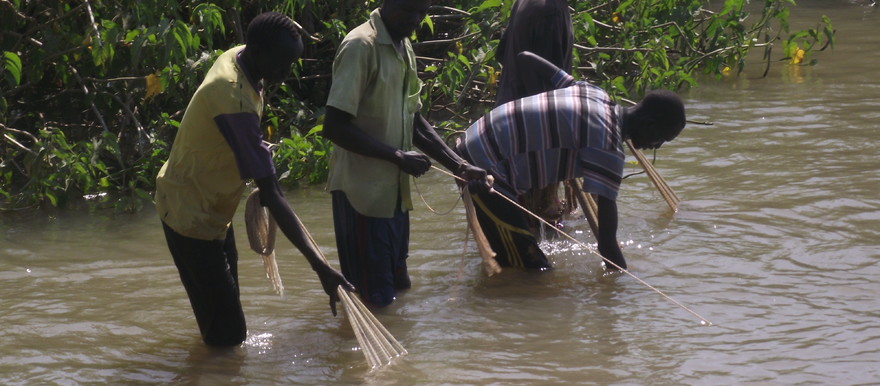Entire communities living along wetlands and lowlands of Northern Bahr el Ghazal State’s Aweil East County have resorted to fishing for food and survival after floods destroyed their gardens and crops.
Many households have migrated to Akuem River since August with many others joining them daily.
Several people who spoke to Radio Tamazuj said hunger had forced them into fishing.
Ajor Achuil, a farmer turned fisherman, said they decided to turn to fish to feed their families.
“We come here to try and catch fish so that our children can have something to eat. Farming has been bad for us this year because the gardens and crops were destroyed by the rains,” Achuil said. “I take a few of the fish to the children to eat and sell a few to buy Dura (grain).”
Akot Kiir, another fisherman said he arrived at the riverside in search of food for his family but revealed that there are still limited fish stocks in the river.
“The river has just started flowing and in a few days it will fill up and then there will be a lot of fish and we will be able to feed. You can catch up to 7 kilograms of fish overnight," Kiir said.
A fisherman who identified himself as Deng Black said hunger drove him to fish after his crops were consumed by the waters.
Black said, “I came to the river to look for food so that we can eat at home. We don’t have Dura except for fish. I cultivated and did not succeed, it failed, and the cultivation was disturbed by the waters.”
Peter Akok Manyuat said they are fishing to find money to buy food for their families. He says living conditions are tougher than last year. He claims that people with a lot of money buy and store sorghum while poor people resort to fishing because they don’t have enough money to buy food.
“We are coming here to fish and if we get a good catch we will go to the areas which were not destroyed by the rains to buy Dura. And if you get 37 kilograms of fish, you sell them and buy sorghum and bring it home. This year’s situation is going to be like or worse than the previous year when people suffered,” Manyuat said.
Some women who have also migrated to the river said they buy fish from the fishermen at affordable prices and take them to nearby markets with the hope that they can make profits to buy food for their families. They however complained about the abundance of fish in the markets which has led to low prices.
“The selling of fish is very challenging for us. We buy fish at high prices but few customers buy from us,” Akon Malou said.
Aluel Aguer, a widow who heads her family, says she and the other women are suffering greatly because the heavy rains destroyed their gardens, their houses collapsed, and that as a result, they suffer from several diseases.
“We have come here because of the harsh conditions. Like me, I am suffering and I don’t have a husband and I don’t have where to sleep,” Aluel lamented. “I sleep in a makeshift shelter. We tried farming but our farms were destroyed.’’




